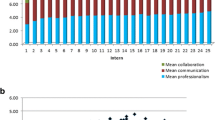Abstract
There is a lack of information on the use of multi-source evaluation to assess trainees’ interpersonal and communication skills in Oriental settings. This study is conducted to assess the reliability and applicability of assessing the interpersonal and communication skills of family medicine residents by patients, peer residents, nurses, and teaching staffs and to compare the ratings with the objective structured clinical examination (OSCE). Our results revealed instruments used by staffs, peers, nurses, and self-evaluation have good internal consistency reliability (α > 0.90), except for the behavioral checklist (α = 0.57). Staffs’, peers’, and nurses’ evaluations were highly correlated with one another (r = 0.722 for staff- and peer-rating, r = 0.734 for staff- and nurse-rating, r = 0.634 for peer- and nurse-rating). However, residents’ self-rating and patients-rating were not correlated to ratings by any other raters. OSCE evaluation was correlated to peer-rating (r = 0.533) and staff-rating (r = 0.642), but not correlated to self- or patient-rating. The generalizability study revealed the major sources of variance came from the types of rater and the interaction of residents and types of rater. This study found self-rating and patient-rating were not consistent with other sources of rating on residents’ interpersonal and communication skills. Whether variations among different types of rater in a multi-source evaluation should be regarded as measurement errors or complementary information is worth further study.
Similar content being viewed by others
References
Becker, M. H. (1985). Patient adherence to prescribed therapies. Medical Care, 23(5), 539–555.
Brennan, R. L. (2001). Generalizability theory. New York: Springer.
Brown, J. B., Boles, M., Mullooly, J. P., & Levinson, W. (1999). Effect of clinician communication skills training on patient satisfaction. A randomized, controlled trial. Annal of Internal Medicine, 131(11), 822–829.
Butterfield, P. S., & Mazzaferri, E. L. (1991). A new rating form for use by nurses in assessing residents’ humanistic behavior. Journal of General Internal Medicine, 6(2), 155–161.
Carraccio, C., & Englander, R. (2000). The objective structured clinical examination: A step in the direction of competency-based evaluation. Archives of Pediatrics Adolescent Medicine, 154(7), 736–741.
Donnelly, M. B., Sloan, D., Plymale, M., & Schwartz, R. (2000). Assessment of residents’ interpersonal skills by faculty proctors and standardized patients: a psychometric analysis. Academic Medicine, 75(10 Suppl), S93–S95.
Duffy, F. D., Gordon, G. H., Whelan, G., Cole-Kelly, K., Frankel, R., Buffone, N., et al. (2004). Assessing competence in communication and interpersonal skills: The Kalamazoo II report. Academic Medicine, 79(6), 495–507.
Eva, K. W., & Regehr, G. (2005). Self-assessment in the health professions: A reformulation and research agenda. Academic Medicine, 80(10 Suppl), S46–S54.
Eva, K. W., & Regehr, G. (2007). Knowing when to look it up: A new conception of self-assessment ability. Academic Medicine, 82(10 suppl), S81–S84.
Fidler, H., Lockyer, J. M., Toews, J., & Violato, C. (1999). Changing physicians’ practices: The effect of individual feedback. Academic Medicine, 74(6), 702–714.
Frank, J. R., & Danoff, D. (2007). The CanMEDS initiative: Implementing an outcomes-based framework of physician competencies. Medical Teacher, 29(7), 642–647.
Gordon, M. J. (1991). A review of the validity and accuracy of self-assessments in health professions training. Academic Medicine, 66(12), 762–769.
Greiner, A. C., & Knebel, E. (Eds.). (2003). Health professions education: A bridge to quality. Washington, DC: The National Academies Press.
Guiton, G., Hodgson, C. S., Delandshere, G., & Wilkerson, L. (2004). Communication skills in standardized-patient assessment of final-year medical students: A psychometric study. Advances in Health Sciences Education, 9(3), 179–187.
Hagedoorn, M., Uijl, S. G., Van Sonderen, E., Ranchor, A. V., Grol, B. M., Otter, R., et al. (2003). Structure and reliability of Ware’s Patient Satisfaction Questionnaire III: patients’ satisfaction with oncological care in the Netherlands. Medical Care, 41(2), 254–263.
Hall, J. A., Irish, J. T., Roter, D. L., Ehrlich, C. M., & Miller, L. H. (1994). Satisfaction, gender, and communication in medical visits. Medical Care, 32(12), 1216–1231.
Hall, W., Violato, C., Lewkonia, R., Lockyer, J., Fidler, H., Toews, J., et al. (1999). Assessment of physician performance in Alberta: The physician achievement review. Canadian Medical Association Journal, 161(1), 52–57.
Heard, J. K., Allen, R. M., Clardy, J., Heard, J. K., Allen, R. M., & Clardy, J. (2002). Assessing the needs of residency program directors to meet the ACGME general competencies. Academic Medicine, 77(7), 750.
Hodges, B. (2003). Validity and the OSCE. Medical Teacher, 25(3), 250–254.
Joshi, R., Ling, F. W., Jaeger, J., Joshi, R., Ling, F. W., & Jaeger, J. (2004). Assessment of a 360-degree instrument to evaluate residents’ competency in interpersonal and communication skills. Academic Medicine, 79(5), 458–463.
Kurtz, S. M. (2002). Doctor-patient communication: Principles and practices. Canadian Journal of Neurological Sciences, 29(Suppl 2), S23–S29.
Kurtz, S. M., & Silverman, J. D. (1996). The Calgary-Cambridge referenced observation guides: An aid to defining the curriculum and organizing the teaching in communication training programmes. Medical Education, 30(2), 83–89.
Levinson, W. (1994). Physician-patient communication. A key to malpractice prevention. Journal of American Medical Association, 272(20), 1619–1620.
Lockyer, J., & Lockyer, J. (2003). Multisource feedback in the assessment of physician competencies. Journal of Continuing Education in the Health Professions, 23(1), 4–12.
Makoul, G. (2001). Essential elements of communication in medical encounters: The Kalamazoo consensus statement. Academic Medicine, 76(4), 390–393.
Massagli, T. L., Carline, J. D., Massagli, T. L., & Carline, J. D. (2007). Reliability of a 360-degree evaluation to assess resident competence. American Journal of Physical Medicine and Rehabilitation, 86(10), 845–852.
Mazor, K. M., Ockene, J. K., Rogers, H. J., Carlin, M. M., & Quirk, M. E. (2005). The relationship between checklist scores on a communication OSCE and analogue patients’ perceptions of communication. Advances in Health Sciences Education, 10(1), 37–51.
McLeod, P. J., Tamblyn, R., Benaroya, S., & Snell, L. (1994). Faculty ratings of resident humanism predict patient satisfaction ratings in ambulatory medical clinics. Journal of General Internal Medicine, 9(6), 321–326.
Miller, G. E. (1990). The assessment of clinical skills/competence/performance. Academic Medicine, 65(9 Suppl), S63–S67.
Newble, D. (2004). Techniques for measuring clinical competence: Objective structured clinical examinations. Medical Education, 38(2), 199–203.
Ramsey, P. G., & Wenrich, M. D. (1999). Peer ratings. An assessment tool whose time has come. Journal of General Internal Medicine, 14(9), 581–582.
Ramsey, P. G., Wenrich, M. D., Carline, J. D., Inui, T. S., Larson, E. B., & LoGerfo, J. P. (1993). Use of peer ratings to evaluate physician performance. Journal of American Medical Association, 269(13), 1655–1660.
Razavi, D., Merckaert, I., Marchal, S., Libert, Y., Conradt, S., Boniver, J., et al. (2003). How to optimize physicians’ communication skills in cancer care: Results of a randomized study assessing the usefulness of posttraining consolidation workshops. Journal of Clinical Oncology, 21(16), 3141–3149.
Regehr, G., MacRae, H., Reznick, R. K., & Szalay, D. (1998). Comparing the psychometric properties of checklists and global rating scales for assessing performance on an OSCE-format examination. Academic Medicine, 73(9), 993–997.
Rowland-Morin, P. A., & Carroll, J. G. (1990). Verbal communication skills and patient satisfaction. A study of doctor-patient interviews. Evaluation & the Health Professions, 13(2), 168–185.
Schnabl, G. K., Hassard, T. H., & Kopelow, M. L. (1991). The assessment of interpersonal skills using standardized patients. Academic Medicine, 66(9 Suppl), S34–S36.
Street, R. L., Jr. (1992). Analyzing communication in medical consultations. Do behavioral measures correspond to patients’ perceptions? Medical Care, 30(11), 976–988.
Stump, T. E., Dexter, P. R., Tierney, W. M., & Wolinsky, F. D. (1995). Measuring patient satisfaction with physicians among older and diseased adults in a primary care municipal outpatient setting. An examination of three instruments. Medical Care, 33(9), 958–972.
Thomas, P. A., Gebo, K. A., & Hellmann, D. B. (1999). A pilot study of peer review in residency training. Journal of General Internal Medicine, 14(9), 551–554.
Turner, J. T., & Dankoski, M. E. (2008). Objective structured clinical exams: A critical review. Family Medicine, 40(8), 574–578.
Violato, C., Marini, A., Toews, J., Lockyer, J., & Fidler, H. (1997). Feasibility and psychometric properties of using peers, consulting physicians, co-workers, and patients to assess physicians. Academic Medicine, 72(10 Suppl 1), S82–S84.
Acknowledgments
We would like to thank all patients, staffs, nurses, and residents who participated in this research.
Author information
Authors and Affiliations
Corresponding author
Rights and permissions
About this article
Cite this article
Leung, KK., Wang, WD. & Chen, YY. Multi-source evaluation of interpersonal and communication skills of family medicine residents. Adv in Health Sci Educ 17, 717–726 (2012). https://doi.org/10.1007/s10459-011-9345-9
Received:
Accepted:
Published:
Issue Date:
DOI: https://doi.org/10.1007/s10459-011-9345-9




